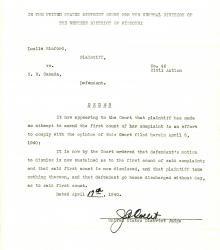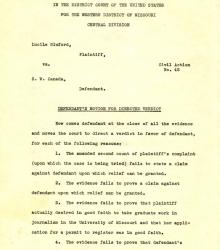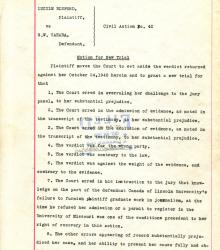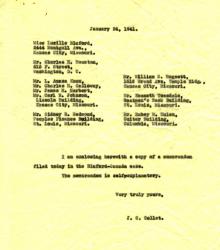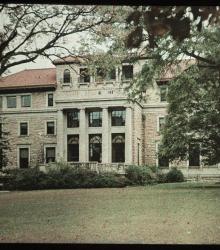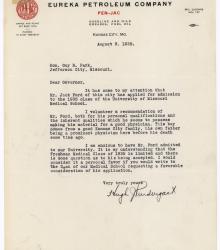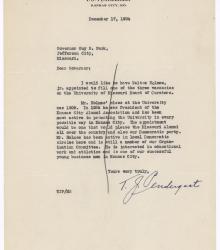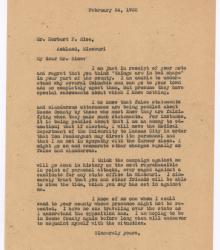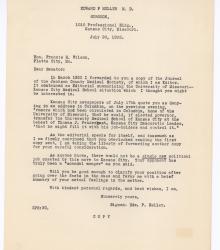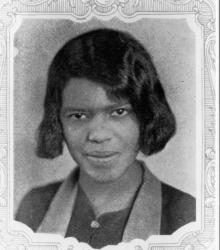Order from Judge J. C. Collet in Civil Action No. 42: Lucile Bluford v. S.W. Canada. Collet dismisses the first count of the case, stating that Bluford "has made no attempt to amend the first count of her complaint in an effort to comply with the opinion of this COurt" from April 6, 1940.
University of Missouri
Motion to dismiss in Civil Action No. 42: Lucile Bluford v. S.W. Canada. The defendant's attorneys argue for the dismal of Bluford's suit against Canada, the registrar of the University of Missouri, stating that she has no standing for the damages she seeks.
Defendant's motion for directed verdict in Civil Action No. 42: Lucile Bluford v. S.W. Canada.
Motion for new trial in Civil Action No. 42: Lucile Bluford v. S.W. Canada. Bluford requests that the court set aside the verdict against her of October 24, 1940, and grant a new trial. Her attorneys argue that the court erred in numerous ways, and that the verdict did not conform to the law.
Memorandum on plaintiff's motion for extension of time for filing and designation of transcript of record and statement of errors in Civil Action No. 42: Lucile Bluford v. S.W. Canada. The memo was sent by Judge John C.
A glimpse into the history of education in Kansas City would not be complete without a profile of Hazel Browne Williams, the first African American fulltime professor at the University of Missouri-Kansas City. Hazel Browne, a native Kansas Citian, was born on February 9, 1907, the only child of John and Effie Moten Browne. She graduated from Lincoln High School in 1923, where she earned the honor of serving as the first woman sponsor major of the school's Reserve Officers' Training Corps (ROTC). Her reputation for breaking barriers would continue throughout the rest of her life.
His name was never a household word in Kansas City and, although Ernest Newcomb played a large part in determining the location of the University of Missouri-Kansas City, he was not even well-known on campus for many years. As the administrative founding father of UMKC, Newcomb is now considered to have been an important figure in the history of higher education in Kansas City, but a change in management during the university’s early years strained his relationship with the school for nearly four decades.
Letter from Hugh Pendergast to Governor Guy Park asking that Jack Ford of Kansas City be admitted to medical school at the University of Missouri.
Letter from Kansas City political boss Tom Pendergast to Governor Guy Park, asking that he appoint Walton Holmes to the University of Missouri Board of Curators.
Letter from democratic candidate for Missouri governor, Francis Wilson, to Herbert Rice, responding to assertions that his campaign in not going well in Boone County.
This essay analyzes Bluford’s initial reporting on her effort to enter MU, her commentary on her failed civil lawsuit in May 1942, and the announcement of the newspaper’s fundraising campaign for African American education in the same month. The facts of Bluford’s three-year crusade to enroll at MU are known: she repeatedly tried to enroll at the university and pursued three lawsuits, losing the last one in April 1942. The fact that she and The Call collaborated to influence readers’ responses to the quest for African American educational rights has not been acknowledged or analyzed.
